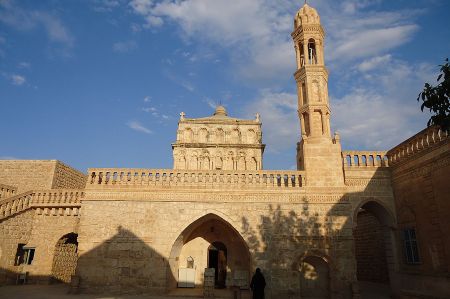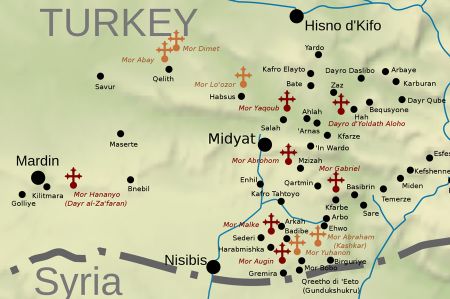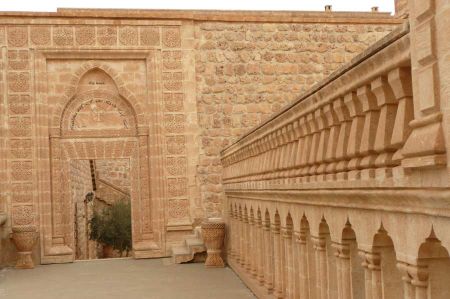Tur-Abdin - Arameans welcome Erdogan's announcement
- Written by Portal Editor
For many years, disputes over the ownership of some large plots of land around the Mor Gabriel Monastery in the Tur-Abdin region between the surrounding villages, i.e. ultimately the Turkish state and the monastery, have been repeatedly pending in the courts.
Even submitted proof of ownership could not convince the Turkish judiciary that the lands had been in the monastery's possession for centuries. The monastery of Mor Gabriel was founded in 397, making it one of the oldest monasteries in Christianity. We had reported several times about the background.
Welcomed the announcement by Turkish Prime Minister Recep Tayyip Erdogan

Understandably, the Federal Association of Arameans in Germany initially welcomed the announcement by Turkish Prime Minister Recep Tayyip Erdogan. As part of the current democratization steps, the land threatened with expropriation is to be returned to the Mor Gabriel monastery. In Heidelberg, the Association of Arameans was "cautiously optimistic" about the reform announcements made by the Turkish head of government, which is only too understandable after the experiences of the last few years.
"We rate the announced reforms positively, even if we have to wait for the announcement of further details on the concrete implementation of the measures," said the association's chairman Daniyel Demir. The Syrian-Orthodox monastery of Mor Gabriel in eastern Turkey has been threatened with expropriation several times in a legal dispute that has lasted for years.

The federal association criticized the fact that the Arameans in Turkey are still not recognized as a minority and therefore cannot exercise their rights, such as the human right to freedom of religion, accordingly. "The construction or maintenance of church buildings is associated with massive difficulties and obstacles; the training of future priests or the teaching of Aramaic, the language of Jesus, has been forbidden to date," emphasized Demir. In addition, there is considerable legal uncertainty and arbitrariness on the part of the local authorities.
As part of the announced "democratization package," Erdogan wants to accommodate the minorities in Turkey. For example, for the first time since the founding of Turkey as a state, teaching in a non-Turkish language is to be permitted in private schools. This would allow the Aramaic monastic schools to apply for regular approval. The villages should also be allowed to get back their old Aramaic or Kurdish names. From 1930 all non-Turkish village names had been replaced with artificial Turkish names. In addition, the "pupils' oath" to Turkishness, first introduced in 1933, which all students have to recite at morning school roll call, is to be abolished.
The Aramean people in present-day Turkey
The Arameans lived mainly in the southeast and east of Turkey, Cilicia, Edessa, Mardin, Diyarbakir, in the Tur Abdin and Hakkari mountains were the largest settlement areas. Due to initial persecution in 1915, the semi-autonomous hill tribes of the Assyrian Church of the East fled their settlements around Hakkari and Qudshanis to the plains of Urmia, and later to Iraq and the Diaspora. In the shadow of the Ottoman actions against the Armenians, the other Christian minorities were also persecuted during the First World War. Numerous members of the Syrian Orthodox and Chaldean Catholic Churches lost their health, homes or even their lives. Many of the surviving Christians emigrated to Syria and Lebanon in 1922 and 1924. The Syrian-Orthodox Patriarch of Antioch, who traditionally resided in the Zafaran monastery near Mardin, felt compelled to leave Turkey in 1924 and also moved his seat to Syria.
The Chaldean Catholic community has only about 8,000 members in 15 parishes or pastoral stations. The archdiocese of Diyarbakir (Amida, founded in 1553), which had been vacant since 1918, was revived for them in 1966, now based in Istanbul. There is a patriarchal vicariate in Istanbul for the approximately 2,000 Syrian Catholics.
The Assyrian Church of the East no longer exists as an organization in Turkey; their former centre of Qudshani in Hakkari is now without Christian residents. A total of 22,000 Arameans live in Turkey today.
For a long time, the Christian Arameans suffered from the clashes between the Turkish military and the fighters of the Kurdish terrorist organization PKK (the organization and its successors are classified as a terrorist organization by Turkey, the EU and the USA, among others). The PKK fighters had retreated to south-eastern Turkey, the original homeland of the Arameans. Due to the PKK's constant attacks on the Turkish military and the operations of the Turkish military in the south-east, Arameans were also victims of the attacks. So they got caught between the fronts until the end of 2012, as both parties accused the Arameans of supporting each other.
In the last elections on June 12, 2011, the Aramean Erol Dora was elected as a member of the Turkish Parliament. He is thus the first Christian MP in the Turkish Republic for more than half a century. It remains to be seen whether the current democratization efforts can also be put into practice. It would be desirable for people from minority groups.
Please read as well:
